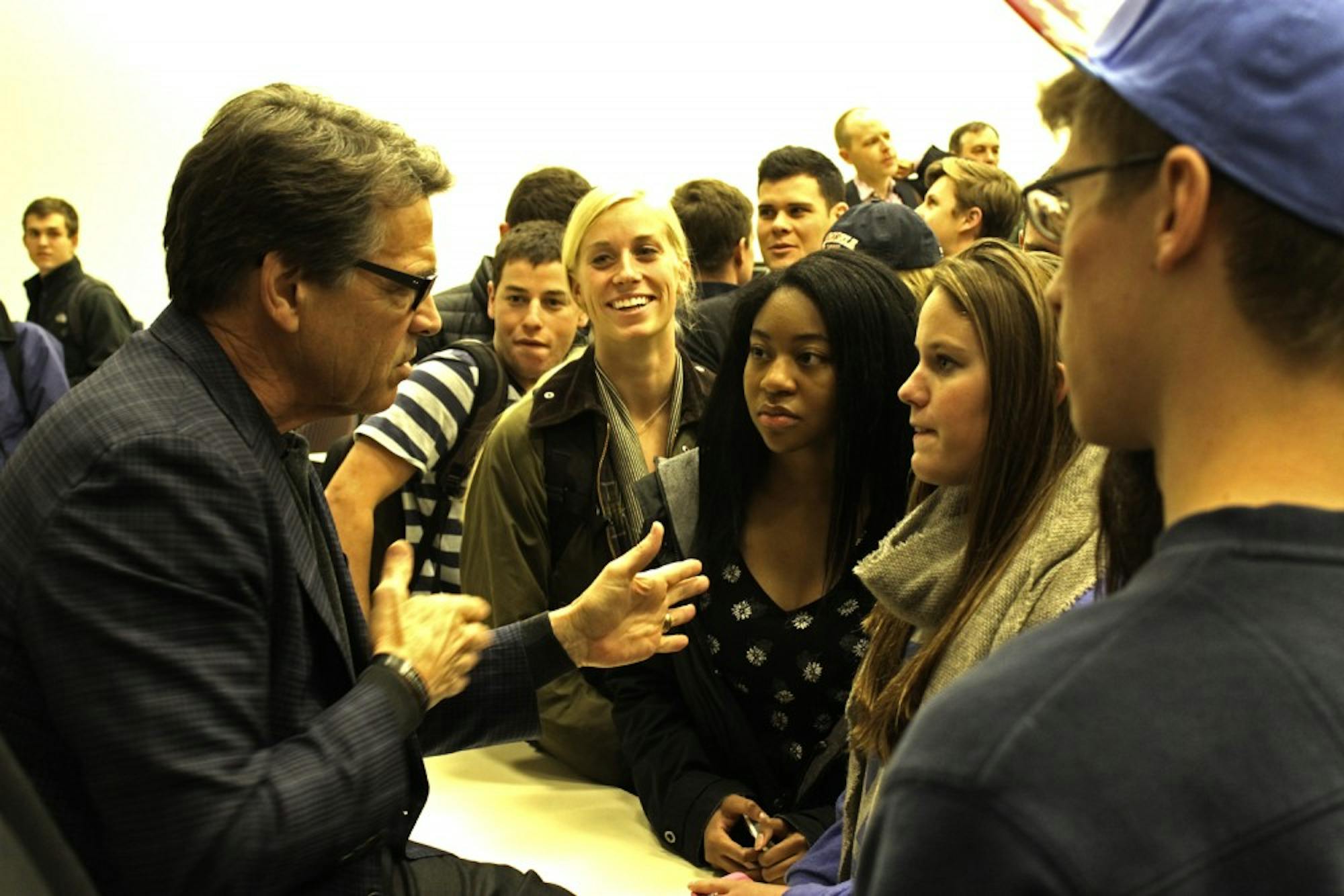Arriving to the tune of “Deep in the Heart of Texas,” Gov. Rick Perry, R-Texas, spoke under the Texas flag about U.S. border security, energy initiatives and foreign policy to an audience of more than 100 people in Wilder Hall Sunday night. Several students raised explicit questions concerning Perry’s stance on homosexuality during the event.
Perry began by describing the results of Tuesday’s midterm elections as an opportune moment for the Republican Party to reestablish itself and confront President Barack Obama’s policies. He connected the current political climate to the aftermath of the 1980s oil glut in Texas, stating that the widespread Republican victories in Congress presented an opportunity for the party to regain Americans’ trust.
“From time to time you’d see a bumper sticker on a car out there that said, ‘Lord, if you’ll just give us one more oil boom, we promise not to fritter it away this time,’” Perry said. “I think that may have been what the message was Tuesday to the Republican Party — ‘Lord, if you’ll just give us one more opportunity to govern, we won’t fritter it away this time.’”
Texas exemplifies productive fiscal policy, Perry said, describing the economy as one of the most successful in the world.
He criticized the Obama administration’s foreign policy and emphasized heightening security at the southern border and approving the Keystone XL pipeline.
Perry said “a majority is a terrible thing to waste,” noting that these issues are particularly important to young people.
“We’ve seen six years of this administration’s work, and we’ve seen a lot of people out of work. We’ve seen foreign policy that is feckless to say the least, we’ve seen our country really struggle, and we’re really concerned about the future,” he said. “The reason I’m engaged in this process isn’t for me. I’m 64 years old. This battle that we’re talking about, these discussions, this discourse that we’re having is about you and it’s about your future.”
When Perry opened up discussion to the audience, several students posed questions, deriding Perry’s views on same-sex marriage.
Emily Sellers ’15 asked if Perry would have anal sex in exchange for campaign contributions of $102 million, while Timothy Messen ’18 accused the governor of comparing homosexuality to alcoholism.
Ben Packer ’17, who wrote and distributed these and other questions, said Perry’s views were more insulting than the questions.
Several members of the audience said they were excited to hear Perry speak but offended by the questions.
“I was really excited to see him come out to Dartmouth and speak with the students and I think he was able to cater towards the entire audience, not only the College Republicans,” Abraham Herrera ’18 said, noting that some students’ remarks were offensive.
“They were phrased in incredibly insulting ways, and I’m horrified,” College Republicans president Michelle Knesbach ’17 said. “We allow people to ask policy-driven questions, but when they’re phrased in an insulting manner, we try to avoid that, because it just detracts from the overall political discourse we can have on campus.”
College Democrats president Spencer Blair ’17 agreed, stating that he understood concerns about Perry’s stance on gay marriage but was disappointed by the tone of the questions.
“I think it’s really disappointing that anyone would undermine a serious political event with sexually explicit questions, and neither I nor anyone from College Democrats would ever condone such behavior,” said Blair. “We appreciate Governor Perry visiting campus, as we encourage any sort of political engagement and discourse here at Dartmouth.”
Zachary Myslinski ’15 said that he thought the questions posed legitimate concerns about Perry’s social policies.
Packer, who identified as neither a Republican nor a Democrat, said that while his efforts were unpopular with the audience, his intent was justified.
“People that are opposed to this act are opposed to it because they think that it hurts their political discussion,” he said. “I think the desired effect was to point out that their political discussion is not meaningful.”
Event organizers discovered Packer’s questions as they were being distributed, and Knesbach asked the audience to remain polite at the beginning of the event.
Packer said that he did not think his desired effect was achieved as a result.
“Since the event organizers knew what we were doing before it happened, they sort of controlled the lens through which the questions were viewed,” Packer said. “The questions – they’re funny, right? I think they’re funny. I think a lot of people think that they’re funny, but since the event had control over the framing of the questions, nobody in the audience laughed. They booed.”
Blair and Sellers are members of The Dartmouth opinion staff.




